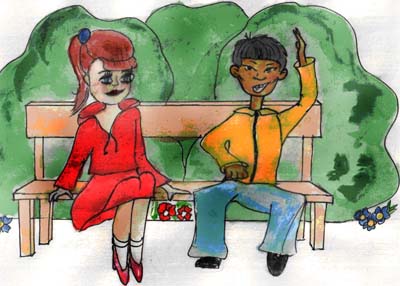A year ago I happened to go to an international camp in
Bulgaria. Before I went there I was afraid that I wouldn’t be able
to understand my new friends because I didn’t speak English
well.

In the morning I met boys and girls from different countries.
There were children from Mongolia, China, Japan, United
Kingdom, and from both North and South America. At first the
main language was smiling. All people like kind words so we
started making our own camp language to communicate with
each other. It was difficult to understand my new friend from
China, Pang. He knew English very well but preferred to keep
silent and be alone. Once I asked him to tell me about China and
his family.
Get the Flash Player to see this player.
He smiled, kept a short silence and finally said, “Our family
lives in Beijing. There are eight of us in the family. My father is
a salesman. My little brother wants to work as a shop assistant
He dreams of becoming a good salesman whom customers will
love and from whom they will always buy different things. He
wants to have the best shop in China.” When he spoke, a smile
appeared on his face.
I understand how important it is to be able to listen to a
person, especially someone who is from a different culture. Later
we became very good friends. Now he sends me e-mails or rings
me up very often.
An open heart and a welcome smile is a signal and call
for friendship.
Exercises
I. Understanding the Story
What do you think is the main idea in this story?
1. It is important to be afraid of strangers.
2. The writer is shy and not happy to meet others.
3. One can understand others if one reaches out to them.
II. Now you Talk
1. What are the different ways to communicate with a new
person?
2. Talk about a time when you tried to make a new friend, and
how you did it.
3. Describe a situation when you have been in a similar situation.
4. In pairs or small group summarize the story in five sentences
and then read to class.
III. Now you Write
1. Write an email from Pang to the author of the story.
2. Write about a time when you had to reach out to someone.
3. Write a newspaper article about the camp. Add more details.
IV. Role Play
1. The writer and her mother: Before leaving for camp, she tells
her mother her fears.
2. The writer and roommate: They try to talk, but they don’t
know a common language.
3. A teacher at camp and two boys: They talk about the boys
being too shy.
4. The writer and Pang: They have a conversation.
5. Two girls: They disagree about talking to people from
different cultures. |

